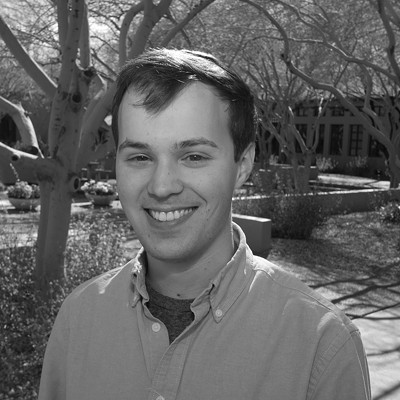Although technically, her family was not living without shelter, but in a former gas station without electricity or running water. Or rather, they lived in the gas station, but the building may have had running water for a toilet. And despite divorce records that show her family had utility bills, Sinema claims the building had no power.
Now that she is Arizona's Democratic candidate for Senate, the elements of Sinema's life story – part of her personal myth-making as a politician – have become part of the 2018 battlefield.
After the New York Times published an article on Monday that called into question elements of Sinema's life story, Republican opponents seized on the story to call Sinema a liar. In a release, the Republican National Committee mocked Sinema with a screengrab from the comedy "Bridesmaids" – a scene where Kristen Wiig pleads on an airplane, "Help me, I'm poor."
In polls, Sinema is neck-and-neck and occasionally leading her Republican opponent, Congresswoman Martha McSally, in one of the most-watched Senate contests this fall.
Here's the heart of Sinema's controversy – the subject of previous investigations in the Arizona Republic in 2016 and the Washington Post just last month:
After a divorce, Sinema's mother Marilyn remarried and in 1984 moved with her three kids from Tucson to DeFuniak Springs, Florida – the Panhandle hometown of her new husband, Andy Howard. For approximately three years, starting when Sinema was 8, they lived in an abandoned gas station near the property of Howard's parents. The gas station, Sinema says, was "without running water or electricity."
By 1987, her mother and stepfather were able to earn enough money to move out of the gas station and into a farmhouse.
But contradicting Sinema's story, Times political reporter Jonathan Martin uncovered records in divorce proceedings that show at the time they were living in the gas station, Sinema's mother and stepfather were paying phone and gas bills.
Martin writes:
In filings from 1985 and 1986 to the judge who handled her parents’ divorce, Ms. Sinema’s mother and stepfather outlined monthly payments they made for an electric bill, phone bill and gas bill while living in the former gas station, which was owned by her stepfather’s parents, according to the records reviewed by The Times. The stepfather’s parents lived in a farmhouse nearby.Sinema's campaign immediately launched a counterattack to rebut criticisms borne out of the Times story.
“We are unable to provide adequately for the children,” Mr. Howard wrote to the court, noting that in the following month his “bills will exceed $2,000 and I will only bring in $1,500.”
Soon after the article went online, the Sinema campaign emailed a list of statements from her mother and stepfather, an aunt, her stepbrother, and a childhood friend, who vouched for Sinema's story of those nearly three years she spent living in the DeFuniak Springs gas station.
In the same email, Sinema's communications director James Owen wrote, "In terms of the divorce documents referenced in the story, as we explained to the New York Times, they are not utility statements or proof of service at the gas station."
Owen added, "As her parents and other reporting have confirmed: the gas station Kyrsten’s family lived in did not have running water or electricity when they lived there."
Additionally, two people quoted in the story renewed their support for Sinema after the article was published, perhaps to avoid the impression of dissension among Sinema's Democratic voters.
In the Times story, activist Tomas Robles of Lucha described Sinema as "not a centrist or a bold progressive but an opportunist."
But in a statement posted to Twitter on Monday, Robles wrote, “Surprised to see this outdated quote and in an article today. I know Kyrsten and I admire her for turning her childhood hardships into motivation to help others in our state."
Likewise, David Lujan, a former state lawmaker who now leads the liberal Arizona Center for Economic Progress, told Martin that in the Legislature, Sinema had to learn to work across the aisle to get things done. "Years ago when we worked together, she told me about the circumstances she experienced, including her time being homeless," Lujan said in a statement emailed by Sinema's campaign.
The Sinema campaign also enlisted several experts to weigh in on controversy. They emphasized that homelessness doesn't necessarily mean one is living without shelter, but also refers to anyone living in an unstable or transient situation.
“Any family living in the conditions Kyrsten was in would undoubtedly be considered homeless," said Amy Schwabenlender, the executive director of Phoenix's Human Services Campus, in a statement provided by the campaign. "Sadly, these are the kinds of situations we often deal with."
Sinema's website now features detailed information on her time growing up in the gas station along with a new video which was posted to YouTube on the same day of the Times story.
In the campaign ad entitled "Grateful, Sinema says that she was taught to never give up. She describes her time living in the old gas station for those three years. The experience helped her become a strong person, she says.
"It didn't have running water, didn't have electricity. Sometimes we didn't have enough food to eat, which as a kid, it was a little bit scary sometimes," Sinema says in the video. "But we made it."
According to her campaign, the video is meant to allow viewers to hear about Sinema's values straight from the candidate.
"These attacks today were disgusting, disrespectful, and went way over the line," Owen wrote in an email to Phoenix New Times. "The materials on the website give background on Kyrsten's childhood."













